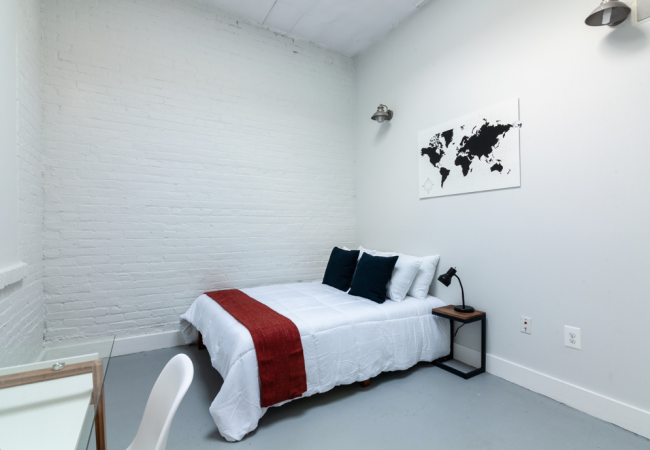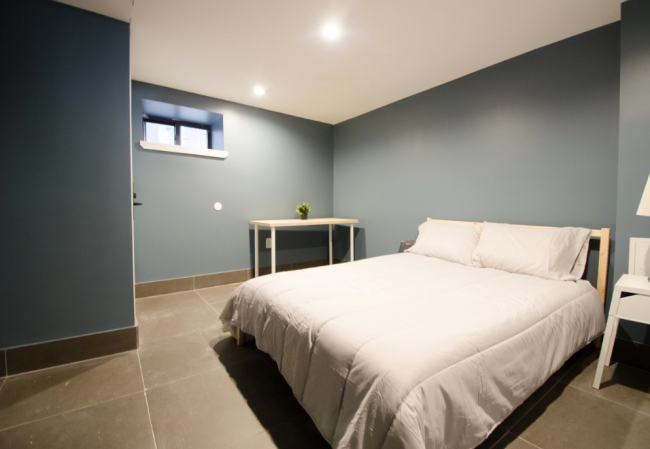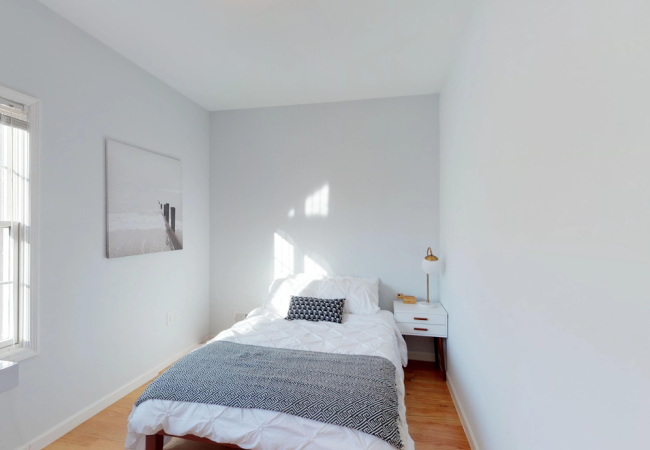What went wrong at Bedly and what co-living renters there can do now

A bedroom in Bedly's Crown Heights building is still listed on the company's website for $1,195 a month.
If you ask what went wrong at Bedly, the co-living company that closed abruptly on July 21st, Martin Greenberg, CEO, prefers to focus on “what went right.”
He wants to make it clear that the co-living company, the subject of glowing profiles in Forbes and other business sites, has accomplished a great deal and changed the experience of finding housing for the better. In an interview with Brick Underground, he says that new co-living companies look to Bedly as a model.
“We started before co-living was a thing. Landlords didn’t know what we were doing. We paved a path for co-living,” says Greenberg.
He would not go into specifics about what went wrong, only to say that the co-living business is extremely complex and requires a lot of resources. (The company raised a total of $7 million in seed funding, he says.)
Bedly renters left dangling
That’s cold comfort to tenants who have not been explicitly told how or when they are getting new leases, or how to get their security deposits, or the $500 furniture deposit that Bedly charges its tenants for its furnished apartments.
Bedly has 600 subtenants in about 200 buildings in Bushwick, Bed-Stuy, Crown Heights, and Harlem, as well as Jersey City and Boston. The company rents furnished apartments that belong to individual building owners. Tenants now need to get leases with the building owners but the situation appears to be a mess: Many Bedly renters say they do not have the owners' contact information, while others do say they can’t get through to their new landlords.
And some tenants are concerned about being locked into new one-year leases. After all, they rented with Bedly because it offered apartments on a short-term basis.
Bedly leases are either one month or month-to-month for an agreed-upon term. And according to one lease shown to Brick Underground, Bedly “reserves the right to terminate this agreement at any time with 30-days written notice to tenant.” Renters that Brick Underground spoke with did not receive 30-day’s notice. The emails that some renters received said utility accounts would be closed out in the next 24-48 hours.
Greenberg says tenants can stay through an August transition period and deposits will not be an issue: Tenants who are staying will have their deposits rolled over to their new landlords, while those who are leaving will get their deposits back. Anyone who needs information should email [email protected], Greenberg says.
When reminded that New York landlords now have 14 days to return security deposits to departing tenants, Greenberg emphasizes, “It is not a problem—if it is the end of a renter’s term, they will get them back.”
A pattern of complaints
However, tenants that Brick Underground spoke with say there’s a pattern of problems with the company, such as new roommates that show up unannounced and in the middle of the night.
But that’s not all. Sam Himmelstein, a lawyer with Himmelstein, McConnell, Gribben, Donoghue & Joseph who represents residential and commercial tenants and tenant associations (and a Brick sponsor), took a look at a Bedly lease and pronounced it “completely illegal."
"They are setting up a rooming house, which violates the anti-SRO law. You can’t rent out rooms because then you are setting up a hotel. In a hotel, there are all kind of safety rules for good reason,” he says. In SRO-type situations, sometimes bedrooms have locks on them, which creates dangerous fire hazards. [You can read more in Brick Underground's "Understanding the legal issue of co-living: Three ways to protect yourself."]
In response, Greenberg explains there are some outdated “legacy leases” still in use. He went on to explain that the anti-SRO laws actually hurt people who need flexibility. “It’s important to rethink our SRO laws. The laws need to change.”
Greenberg insists all of Bedly’s properties are safe and thoroughly inspected, so SRO-type fears are not an issue. What is important is the experience, he says.
“The end result is that consumers are getting more choice and better experiences. We’re providing better flexibility and are very proud of what we accomplished," Greenberg says. He seemed unaware of the disconnect between his words and the bedlam triggered by Bedly's sudden shutdown. He went on to say that Bedly has charted a path for co-living companies.
“Every co-living CEO has said to us, ‘We learned from you, we studied you.’ That’s something for our team to be proud of."
What tenants can do now
Himmselstein says tenants are in a position to sue for breach of contract.
He also recommends tenants go to the Department of Buildings and check their building’s property profile to see if it is occupied in violation of the C of O, in which case a landlord can’t collect rent. And if a building has six or more units, renters should see if the property is actually rent stabilized, in which case a tenant may be overpaying.
Editor's Note: You can also read "How Bedly co-living renters can file a complaint or start a court case" for information on contacting the Brooklyn District Attorney's Action Center and the Office of the Attorney General's Consumer Fraud Bureau.
Brick Underground continues to hear from frantic renters.
Riley H. of Minnesota signed a lease with Bedly for an apartment in Jersey City and paid a $500 fee. He received a welcome email yesterday with access codes to the building’s and apartment’s front doors and a confirmation for a move-in today. He provided screenshots of all communication to Brick Underground.
But it turns out there is someone still living in his room and he can’t move in. A woman who would have been Riley’s roommate texted him to let him know.
“Bedly had me sign a lease while someone else was living in my room. They let me sign that lease without even caring that I wouldn’t even be able to move in,” Riley says.
"It's not a good look"
Benjamin Chester, a Bedly co-founder who left the company a year ago, acknowledges that scenarios like Riley’s “don’t look good from the outside.”
Chester was forced to resign after a “difference of opinion on how to run the company,” he tells Brick Underground. He now works for a software company. He says the split was amicable, and echoed Greenberg’s goal to simplify the rental experience, and confirmed that renting by the room was part of the model.
Their vision of co-living was not about brunch and rooftop barbecues, he says.
Chester says they were aiming at young professionals in their early 20s “who didn’t want the kumbaya or yoga. They want some privacy and a better experience than using Craiglist,” he says.
“We were building something that could change things for the better,” he says. About Bedly's current situation, he says, “I don’t get the sense that things are finalized yet. It doesn’t look good from the outside but I think it’s premature to jump to conclusions. I’m not directly involved but there are people there that care very deeply for renters. I remain hopeful that things will be sorted out.”
You Might Also Like




























